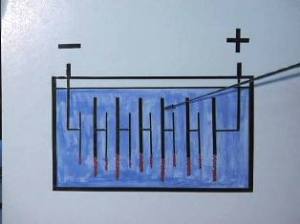
Battery Sulfation
To properly maintain and extend the life of your lead acid batteries you need to have a basic understanding of what a battery is and how it works. A lead acid battery has several cells connected in series. Each cell produces approximately 2.1 volts, so a 12-volt battery with six cells in series produces an output voltage of 12.6 volts. Lead acid batteries are made up of plates, lead and lead oxide submersed in a solution that is 35% sulfuric acid and 65% water. This solution is called electrolyte. The size of the lead plates and the amount of electrolyte determines the amount of charge a battery can store.
When you test a battery, using a hydrometer, you are measuring how much sulfuric acid is in the electrolyte. When the reading in a cell or cells is low it means the chemistry that keeps the battery charged is low. This can be a result of a battery that has been watered too much, diluting the acid content, or it can be a battery that is discharged and the sulfate is attached to the plates. If you recharge the battery in a timely manner the sulfate material reverts to lead, lead dioxide and sulfuric acid. If a battery is discharged for an extended period of time and not recharged the sulfate material that attaches to the discharged portions of the plates begins to harden into crystals. Eventually this sulfate cannot be converted back into active plate material and the battery is ruined. Sulfation is the number one cause of lead acid battery failure.
The Lesson: This is especially important for deep cycle lead acid batteries. Sulfation can be avoided if a battery is fully recharged immediately after a discharge cycle. A battery cycle is one complete discharge from 100% down to about 70% or below and then re-charged back to 100%. Recharging a lead acid battery in a timely manner can literally add years of life to a deep cycle battery. On average you should easily get 6 to 7 years of use from a deep cycle battery not 2-3 years.
Mark Polk



You must be logged in to post a comment.